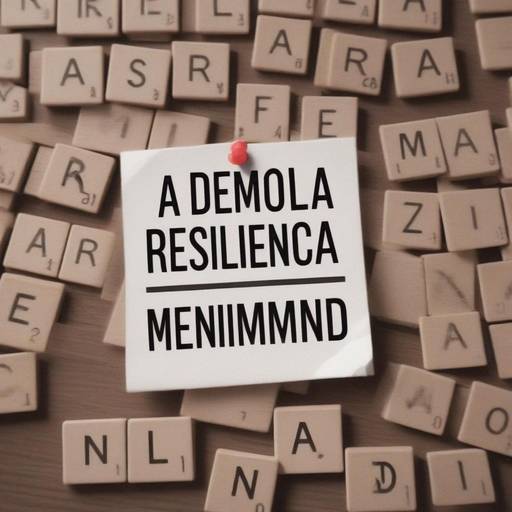
Introduction
Have you ever been overwhelmed by the stress and pressure of daily life? Have you wondered how some people can face the difficulties with strength and maintain their emotional well-being? Resilience is the key to dealing with life's challenges effectively and avoiding exhaustion. In this article, we will explore in depth the concept of resilience, its importance in the prevention of exhaustion (burnout), and how it can contribute to emotional well-being. We will discover what resilience is, its history, benefits and challenges, strategies to develop it, as well as its relationship with burnout and emotional well-being. We will also include practical advice, expert opinions, case studies and future trends.
History and Background
Resilience has been a topic of interest for centuries. Throughout history, different cultures have promoted resilience as an important value to survive and thrive in difficult times. From philosophical teachings to spiritual practices, resilience has been recognized as an essential quality for mental and emotional strength. In the twentieth century, psychologists and emotional welfare experts began to study resilience more systematically, leading to a greater understanding of their mechanisms and benefits. Resilience has become an interdisciplinary research field covering psychology, sociology, neuroscience and other disciplines, integrating different perspectives to understand how people can overcome adversities and recover from them.
Analysis in Deep
Resilience is not just about resisting and surviving, but adapting, growing and flourishing in the midst of adversity. Resilient people not only overcome difficulties, but also find meaning and purpose in their experiences. Research has shown that resilience can have positive effects on mental, emotional and physical health. Resilient people tend to have greater self-esteem, to be more optimistic and to have better coping capacity. However, developing resilience is not an easy task and involves challenges, especially in a world where stress and pressure are omnipresent.
Exhaustive examination
To develop resilience, it is essential to cultivate psychological skills and resources that strengthen our ability to cope with and overcome stressful situations. Emotional self-management, the search for social support, the ability to find meaning in adverse experiences, and the ability to regulate stress are key components of resilience. The development of resilience not only has individual benefits, but can also have a positive impact on the working, family and social environment.
Comparative analysis
It is important to understand that resilience and burnout are related but opposite concepts. While resilience implies the ability to cope with and overcome adversity, burnout occurs when prolonged stress and overwhelming labor pressure exhaust a person's emotional and physical resources. Emotional well-being, for its part, is closely linked to resilience, as it implies the ability to manage emotions in a healthy way and maintain a state of balance and emotional satisfaction. Building resilience can be an effective strategy to prevent burnout and promote emotional well-being in different areas of life.
Practical Tips and Accessible Tips
To cultivate resilience, it is essential to develop habits and strategies that strengthen our ability to face challenges. Some practical actions include the regular practice of mindfulness, physical exercise, the establishment of realistic goals, the search for social support, and the cultivation of a sense of purpose and meaning in life. In addition, it is important to learn how to handle stress effectively, establish clear limits in work and personal life, and seek professional help if necessary. The development of resilience is a continuous process that requires practice and patience, but it can have a significant impact on the way we face and overcome the challenges.
Industry Perspectives and Expert Reviews
Experts on mental health and emotional well-being emphasize the importance of promoting resilience as a preventive strategy against exhaustion and other negative consequences of chronic stress. In the working environment, organizations can implement well-being programs that promote resilience and effective stress management among their employees. In addition, psychology and mental health professionals can play a key role in building resilience skills in their patients and in promoting more resilient working environments and communities.
Case Studies and Real Life Applications
Many cases of study have demonstrated the effectiveness of resilience development strategies in different contexts, from work to crisis and trauma. For example, resilience training programmes for health professionals have proven to reduce the risk of burnout and improve the ability to manage stressful situations. Likewise, individuals who have experienced traumatic situations have managed to recover and rebuild their lives through their resilience and ability to overcome adversity.
Future Trends and Predictions
As awareness of the importance of resilience and emotional well-being increases, strategies and programmes for their development are expected to be increasingly present in various fields, from education to work. In addition, the integration of resilience-based approaches into medical care and stress management will have a significant impact on the prevention of exhaustion and the promotion of mental and emotional health.
Conclusion
Resilience is a fundamental quality to face the challenges of life with strength, adaptability and hope. In developing resilience, we can not only prevent exhaustion and promote our emotional well-being, but also transform our adversities into opportunities for personal growth and development. Cultivating resilience is not only beneficial at the individual level, but also has the potential to generate a positive impact on our relationships, working environments and communities. As we strive to develop our resilience, we can contribute to building a stronger, hopeful and emotionally healthy world.
Frequently asked questions
**1. What is resilience and why is it important?**Resilience is the ability to face and overcome adverse situations, recover from difficulties and maintain an emotional balance. It is important because it helps us to face the challenges of life with strength and adaptability, promoting our emotional well-being and preventing exhaustion.
**2. What are the strategies for building resilience?**Some strategies to develop resilience include the regular practice of mindfulness, the establishment of realistic goals, the search for social support, the cultivation of a sense of purpose and meaning in life, and the effective management of stress.
**3. How does resilience relate to burnout?**Resilience and burnout are related in an opposite way. While resilience implies the ability to cope with and overcome adversity, burnout occurs when prolonged stress and overwhelming labor pressure exhaust a person's emotional and physical resources.
**4. What role do companies play in developing the resilience of their employees?**Companies can play a key role in developing the resilience of their employees by implementing well-being programs that promote effective coping skills and stress management. Promoting a working environment that values mental and emotional health, as well as providing resources and support to employees, are key strategies for building resilience.
**5. Are there cultural differences in resilience?**Yes, cultural differences can influence how people develop and express resilience. Cultural beliefs, values and practices can play a significant role in how people face and recover from difficulties.
**6. How can I promote resilience in my daily life?**To promote resilience in your daily life, you can focus on cultivating effective coping skills, seeking social support, practicing self-care, recognizing your strengths and resources, and seeking meaning and purpose in your experiences. Resilience development is a continuous process that requires practice and determination, but it can have a significant impact on your emotional well-being and ability to face the challenges of life.
In short, resilience is an invaluable quality that allows us to face the challenges of life with strength and adaptability, promoting our emotional well-being and preventing exhaustion. By understanding their importance, developing effective strategies for their cultivation and applying them in our daily lives, we can strengthen our ability to cope with adversity and find meaning and growth in our experiences. Resilience is not only a tool to face difficulties, but it is also a key to building an emotionally healthy and satisfying life.






















































